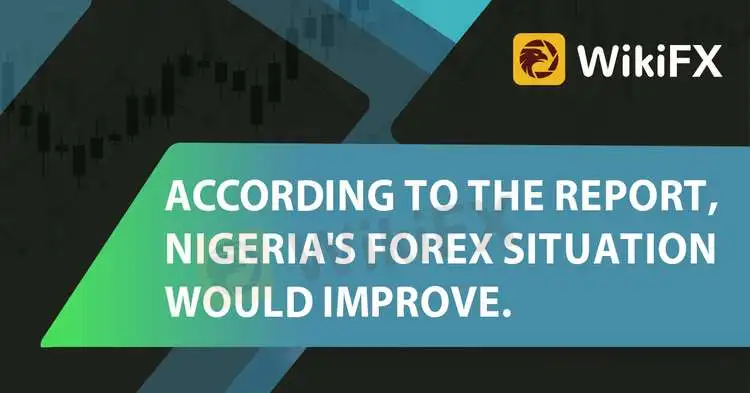ACCORDING TO THE REPORT, NIGERIA'S FOREX SITUATION WOULD IMPROVE
Abstract:The monetary authority is well placed to relieve foreign currency (FX) pressures, as its coffers have been bolstered by a significant $7.3 billion liquidity - $4 billion Eurobond issue and $3.3 billion special drawing right (SDR) from the International Monetary Fund (IMF).

The monetary authority is well placed to relieve foreign currency (FX) pressures, as its coffers have been bolstered by a significant $7.3 billion liquidity - $4 billion Eurobond issue and $3.3 billion special drawing right (SDR) from the International Monetary Fund (IMF).
These are among the estimates made by EFG Hermes in its research, “The Year Ahead 2022 — Recovery intact, but expect turbulence.”
According to the article, a number of local banks have been active in the foreign debt market, generating billions of dollars, which will aid in the improvement of FX liquidity.
According to the paper, “we are less hopeful that this position would contribute to a sustained improvement in FX conditions.” First, the country has failed to gain from the high oil price environment, which is another setback for Nigeria's economy.
According to the report, a steep 20% to 30% reduction in crude oil output and a sizable fuel subsidy bill have eaten up most of the advantage of increased oil prices, leaving the Central Bank of Nigeria (CBN) struggling to develop external foreign reserves.
“Because there is no inherent buildup of reserves, one-time inflows are unlikely to alleviate the FX difficulties.” “Secondly, the CBN has demonstrated a clear policy preference for maintaining low interest rates.” As a result, we believe it is doubtful that the CBN would hike rates sufficiently to stabilize the naira, much alone lure foreign money into the nation.
According to the research, “in this regard, we only foresee a partial resolution to the FX difficulties as the CBN clears some of its backlogs.” The CBN, on the other hand, would need to maintain its reserves while economic activity gradually improves; so, we anticipate a devaluation to N430-440 against the USD in the coming months.
The analysis highlighted two chances for the outlook: a faster-than-expected increase in crude oil output, which would ultimately allow the government to develop reserves; and a slower-than-expected increase in crude oil production. The second, it argued, is advanced economies' on-lending of SDR allocations.
“Nigeria's portion of France's ambition to quadruple Africa's allocation to $100 billion now stands at $6.6 billion, with tremendous upside potential.”
“However, we are less enthusiastic about the latter since we anticipate that funding will be allocated based on some type of conditionality.” “We do not feel Nigeria is in a good enough shape to move forward with changes, especially because 2022 is a pre-election year,” it said.
Zainab Ahmed, Minister of Finance, Budget, and National Planning, said that the government intends to liberalize fuel prices this year but has only funded for six months of subsidies in the appropriation.
“We do not believe such a measure will be implemented because the administration is unlikely to raise fuel prices by at least 50%-60% just months before presidential elections,” the research concluded.
The research also focused on consumer products, predicting that food and beer makers will continue to face cost pressures as a result of currency shortages and an inflationary climate, limiting Nigeria's consumer firms' capacity to achieve higher profitability.
“In terms of the top line, we expect the low base impact seen in 2021 to fade, and we foresee more moderate growth.” With fewer SKUs to appeal to the lower end of the market, affordability remains a key priority.
“We feel industry values remain stretched, notwithstanding Guinness Nigeria's attractiveness.” Because 2022 is a pre-election year, electioneering activity is expected to boost money in circulation, which might act as a spur for increased discretionary and non-discretionary expenditure, according to the analysis.

Related broker





Read more

Forex Hedging Strategies Explained: Smart Risk Management for 2025
Learn how to hedge in forex trading with real examples, timing strategies, and risk tips. A 2025 guide to smart hedging for retail and institutional traders.

Harsh Truths About ATC Brokers Every Trader Must Know
Many regulated brokers hide the risks associated with them. They never talk about these risks and try to attract customers with appealing offers. Later on, customers discover these hidden risks and feel disappointed. Before you come across a similar situation, we want to let you know the risks involved with ATC Broker. Check out the article to discover the harsh truth about it.

8 Golden Rules to Rule in the Forex market
These are important rules that most people won’t tell you. Whether you’re new to Forex beginner or have been trading for a while, these tips can help improve your trading journey. Read this article to learn the key rules every trader should keep in mind.

Top Reasons Why Prime FX CFD is Not Worth Your Investment
Prime FX CFD is constantly grabbing headlines, but not for the right reasons. It has become an infamous name in the forex market, which, otherwise, has become the reason for many becoming financially independent globally. Investors have been taken for granted as scams keep happening. We have found some red flags with this scam forex broker. In this article, we will let you know about them. Keep reading!
WikiFX Broker
Latest News
PrimeXBT Launches MT5 PRO Account for Active Traders
eToro Expands into Singapore with MAS CMS Licence
Renault shares plunge 16% after French carmaker lowers guidance, appoints new interim CEO
Darwinex Launches INDX: A Revolutionary Investment Strategy for Traders
Top Forex Trading Scams to Watch Out for in 2025
Real Risk Factors with Admiral Markets ! Explained
5 Reasons to Know Why INFINOX Is a Standout Broker?
5 things to know before the stock market opens Wednesday
Trump's big beautiful bill' caps student loans. Here's what it means for borrowers
Weekly mortgage demand plummets 10%, as rates and economic concerns rise
Rate Calc
